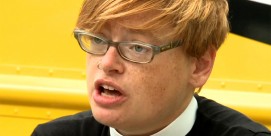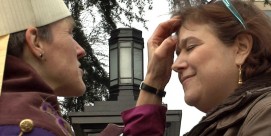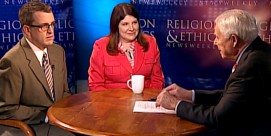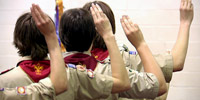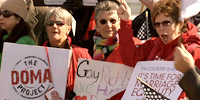In This Episode << SLIDE LEFT TO SEE ADDITIONAL SEGMENTS
Gene Robinson: In the Eye of the Storm
BOB ABERNETHY, anchor: Next month marks five years since the Episcopal diocese of New Hampshire elected that denomination’s first openly gay bishop, Gene Robinson, a move that has brought the U.S. Episcopal Church and the entire worldwide Anglican Communion to the brink of schism. Robinson has a new book coming out discussing his experiences and his controversial plans for the future. He spoke with Kim Lawton.
KIM LAWTON: In 2003, with his longtime partner Mark Andrew at his side, Gene Robinson became the first openly gay bishop in the Episcopal Church and in the worldwide Anglican Communion, which the U.S. church is part of. Now Robinson is planning another ceremony likely to roil the waters again. In June, Robinson and Andrew will have their relationship officially recognized at the New Hampshire statehouse. Then they’ll walk across the street and have the union blessed at St. Paul’s Episcopal Church.

Bishop Gene Robinson |
Bishop ROBINSON: Frankly, a legal civil union, which the state of New Hampshire has allowed as of January 1, gives my partner and me some 400 of the protections that out of 1,100 that are accorded to heterosexual couples.
LAWTON: Because of strong opposition to homosexuality in many parts of the Anglican Communion, U.S. Episcopal bishops have agreed to “exercise restraint” in approving the blessing of same-sex unions. But they also pledged to provide for the pastoral needs of gay and lesbian church members.
Bishop ROBINSON: We’ll keep the service private. It will not be in your face, so to speak, and yet, at the same time, I deserve the same kind of pastoral care from the church that other couples do in my own diocese, so I’m trying to walk a fine line there.
LAWTON: The bishop has continued to receive death threats since his election. Security was high for his consecration service, where he wore a bullet-proof vest. Because of his ongoing safety concerns, Robinson says he wanted to have his union officially recognized before he heads to England in July for the Lambeth Conference, a once-every-10-years gathering of Anglican bishops.
Bishop ROBINSON: I’m just not willing to go to Lambeth and once again put myself potentially in harm’s way without protecting this person I’ve been with for 20 years as best I can. I think it’s something any husband or wife would do.

Consecration of Bishop Gene Robinson |
LAWTON: After some conservative Anglican bishops threatened a boycott, Archbishop of Canterbury Rowan Williams excluded Robinson from formally participating in the Lambeth gathering of more than 800 Anglican bishops from around the world. Robinson is upset by this but says it has actually freed him up to still go and be a more vocal activist at sessions outside the official conference.
Bishop ROBINSON: I think I go with a greater sense of focus on gay and lesbian, bisexual and transgendered people around the world. I think they are looking to me to represent them and be their voice in some way. I’m sure that’s not what the Archbishop of Canterbury was hoping for, and I suspect he would prefer me not to come at all.
LAWTON: U.S. bishops are planning two unofficial meetings where international bishops can meet Robinson.
Bishop ROBINSON: I know there are so many bishops around the world who have never had the opportunity to sit and talk with someone who is both openly gay and Christian.
LAWTON: Robinson says he’s discouraged by the divisions and what he sees as a lack of listening across the Communion. But in his new book, IN THE EYE OF THE STORM, he writes of the spiritual lessons he has learned amid the controversy.
Bishop ROBINSON: I don’t remember a time in my life when God seemed any more present, almost palpably close. Prayer has almost seemed redundant to me because God has seemed so close during all of this. It will surprise both conservatives and liberals how orthodox I am.
LAWTON: But determining what actually defines Anglican orthodoxy will be a major point of debate at Lambeth and well beyond.
I’m Kim Lawton reporting.

